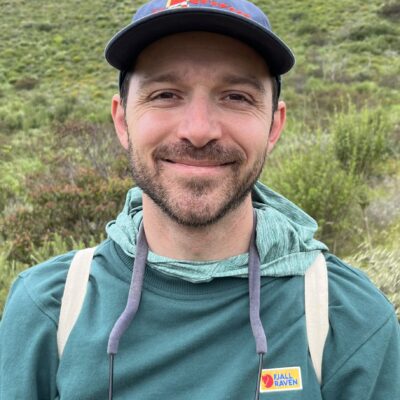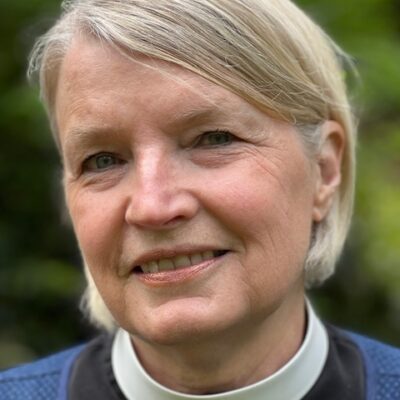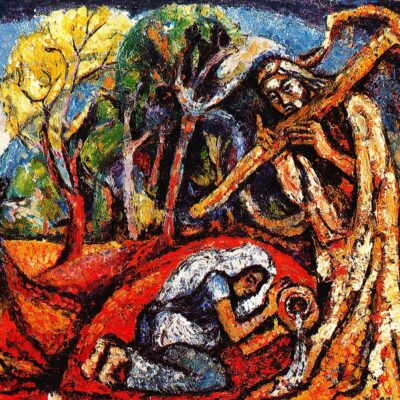by the Rev. Robert C. Laird
In New York City this week,
Dr. Craig Spencer was released from Bellevue Hospital,
the latest in a string of Americans
to contract and recover from the Ebola virus,
which is raging through Western Africa,
including in Guinea,
where Dr. Spencer had been treating Ebola patients
with the group Doctors Without Borders.
Since September 28, when the first case of Ebola
was diagnosed in the US,
there have been eight other cases
that have been diagnosed,
with one fatality.
With those numbers,
the statistics are very clear:
among Americans, you are seven times more likely
to have been married to either Larry King or Liz Taylor
than you are to die from Ebola.
Which brings me to my favorite joke about Ebola
from the last few weeks,
which you have probably heard;
I’d tell it to you,
but the truth is you’re not going to get it.
All joking aside,
Ebola is a very serious illness,
and one that has grave consequences
for those who contract it,
particularly those who contract it
in Western Africa,
where survival rates are more like 50%,
due to a lack of medical supplies,
medical systems with the capacity
to treat Ebola effectively,
and social structures that help contain the disease;
the virus has wiped out whole families,
with mothers getting infected
by holding and soothing sick children,
and children contracting the disease
from burying dead relatives.
It’s a horrible tragedy.
But Ebola has a related tragedy
that is raging through our cities and towns even now:
the FEAR of Ebola.
Fear has gripped our nation in the last 45 days
as the story about Ebola,
which was a story of a horrible but distant virus
in far off places that were easy to forget,
came home in a frightening way on September 28 in Dallas.
Since then,
multiple states have enacted and then repealed
mandatory quarantines for people
who are absolutely no risk to anyone,
simply because people are afraid
of something that they have a 13 million-to-1 chance
of contracting, let alone dying of.
We know how to treat Ebola,
and we’ve gotten pretty good at it,
especially in hospitals
that have good track records
at containment of infectious diseases.
But the irrational fear persists;
hundreds of children have been held home from schools;
there’s been talk of cancelling all travel to countries affected;
politicians have taken the opportunity to conflate
fears of Ebola with undocumented immigration,
to use the fear we feel to address other political aims:
“Ebola is bad, so close the border to Mexico.”
The World Bank reported on September 17
that as much as 90% of the economic impact
of the Ebola outbreak was fear related,
(and therefore an utter waste of time and money)
in closing transportation systems,
including airports and seaports,
and keeping people away from their jobs. [1]
This bears a striking resemblance to the Gospel for today,
in the Parable of the Talents.
Jesus paints the scene of a property owner
who has entrusted three slaves
with three enormous amounts of money;
a Talent was a measure of weight
from anywhere 28-30 kg,
or nearly 70 lbs.
In financial terms,
a talent was worth nearly 15 years salary
to the average worker;
so giving the first slave 5 talents
meant that the property owner
gave that person several lifetimes of money
to oversee and grow.
And the first two slaves did just that:
they multiplied their talents,
both by double;
and both were not only honored for their efforts,
but were welcomed into the joy of their master.
Notice, one earned five more talents,
and one earned two more talents,
but the reward for both of them is the same:
they enter into their master’s feast.
But then there is the third one;
the slave who was afraid,
and buried his talent in the ground,
so that it didn’t even earn interest.
This gets complicated, and ugly;
the property owner calls him “Wicked and lazy,”
and he accuses the property owner
of reaping where he doesn’t sow…
And having done nothing with the talent that was given him,
this slave is cast into the outer darkness,
and does not enter into the joy of his master.
A harsh punishment,
for having failed to do anything
What do we make of this whole mess?
This is the third of four parables that Jesus tells
in Matthew’s Gospel in which he’s talking about
what will happen when Jesus returns,
when he comes back one day
and he judges how things have gone without him.
We can assume that Jesus is the property owner in this parable;
he’s been talking about the end times
in all of Chapter 25 of Matthew’s Gospel;
as you may remember from last week,
we talked about Jesus being the bridegroom,
and all the bridesmaids being the church,
whether we had oil for our lamps or not;
today is no different.
Jesus is the property owner,
and he has given talents to his people,
and will be coming back one day,
and will want to know what we made
of the talents that he gave us,
how we used them and what we made of them.
Jesus has given a talent to the third slave,
to the one who is so different from the other two,
and what has he done with that one talent?
Nothing, absolutely nothing.
And it seems fitting,
given what he says to the others
about how they have done much with little,
that this particular slave
should have the fewest talents to manage;
it’s likely that the property owner
(that is to say Jesus)
already knew that he wouldn’t be able
to do very much with that talent,
and so he only gave him one,
instead of giving him 2 or 5,
like the other slaves in the parable.
No, this slave is paralyzed by fear,
and does absolutely nothing
with the talent he was given,
choosing instead to hide it in the ground,
rather than taking a risk and losing.
And this guy gets royally called on the carpet for his choice.
Jesus makes it clear that he has no time
for someone who hides his head in the sand,
and doesn’t get out there
and confront his own fears for the sake of the Gospel.
The thing is, it’s really human,
having these significant fears.
After all,
isn’t that what’s driving our country’s policy decisions
around the Ebola epidemic right now: fear?
It’s very human to be afraid;
as individuals, we’ve all been afraid,
usually for very good reasons;
yet we as people, together,
are often afraid for all the wrong reasons:
White people in the US are notoriously afraid
of African Americans, especially African American men,
even when there’s nothing to be afraid of;
an incident from 2009 when Harvard professor
Henry Louis Gates was arrested
for attempting to enter his home
in Cambridge, Massachusetts, springs to mind;
a neighbor called the cops,
reporting a black man possibly breaking into a home.
Senator Joseph McCarthy’s investigations
into alleged communist activities
is a great example of fear driving policy,
often to the detriment of freedom.
Even going back in our nation’s history to 1682,
the Salem Witch Trials are another good example
of public panic leading to gross injustices
on behalf of the population.
It is truly human to be afraid,
to feel panic in the face of events that are
beyond our control,
and make us feel that our lives are threatened
and our world capricious and harsh.
And Jesus is teaching us
that in the Kingdom of God,
fear like that is not only not needed,
but can be downright destructive.
In fact,
the very fear the third slave felt
led to his downfall;
the fear of his master
became a self-fulfilling prophecy,
leading to his downfall.
Christ is asking in this parable
to resist our fear,
and trust Christ in all things;
only in this way can we
enter into joy upon our master’s return.
Jesus doesn’t ask us to make something out of nothing,
but to make something out of the abundance
that he gives to each of us,
the talents that each of us have been given
to use for the Glory of God.
But how do we do that?
As individuals,
Jesus is calling us to live without fear;
one of the things he says most in the Gospels
is “Be not afraid;”
and it’s almost always the first thing an Angel says
when they greet someone in the Bible.
Part of growing as a disciple is learning to act
in the face of our fear,
to take our talents and multiply them,
even when we’re afraid;
doing so takes courage,
and prayer, and trust;
none of it is easy,
but it’s all worth doing.
But we’re also called to live without fear
as communities,
trusting the work of Christ among us,
even when we can’t see what the future holds.
As we at St. Luke’s look to the future,
it’s not clear what God has in store for us;
all we know for sure is that Jesus is with us,
and that is enough.
After all,
Jesus has a solid track record at St. Luke’s:
the ways that Jesus has been known and felt here
though all the decades is amazing,
and we have every reason to believe
that Christ’s blessings will continue,
that there is vital and engaging work to be done here
in Ballard by this group of individuals,
rooted in the experience of Christ’s love,
and reaching out to this neighborhood,
this city, and this world,
sharing Christ’s love in a way
that the world can receive it,
because Christ’s love doesn’t change,
whenever even two or three are gathered in his name,
he is in their midst.
But if we let fear get the best of us,
if we are controlled not by our love for Christ,
but our fear of what might be different,
or fear that Jesus won’t really be there with us,
or fear that Jesus may be inviting us to change,
to realize that who we were is not the same
as who we will be,
through Christ’s transforming love,
then we run the risk of frittering away the talents
that Christ has given us,
or burying them in the ground,
and having nothing to return to Christ
when he returns in glory.
Whether in the face of a disease like Ebola,
which our nation is attempting to address
with compassion and logic,
and not panic and fear;
or in the face of a need to share the Gospel
and invite new people to join our community
and change us through their presence,
even though that will require us
to change as individuals and as a community,
Jesus calls us to face our fear,
trusting that Jesus has given us resources
as vast as the property owner gave to his slaves:
a lifetime of resources,
more than we could ever hope or deserve,
and enough for us to make use faithfully
to make a real difference in a world
that desperately needs Jesus,
a world that could be transformed by Jesus,
a world that is called to live without fear,
trusting in grace of Jesus Christ.
Jesus is calling us all to a life without fear,
a life lived with Christ, in community.
It brings to mind the words of one of the 20th Century’s
most famous Episcopalians,
Franklin Delano Roosevelt,
in the words of his first inaugural address:
“This is preeminently the time to speak the truth,
the whole truth, frankly and boldly.
Nor need we shrink
from honestly facing conditions in our country today.
This great Nation will endure as it has endured,
will revive and will prosper.
So, first of all, let me assert my firm belief
that the only thing we have to fear is fear itself—
nameless, unreasoning, unjustified terror
which paralyzes needed efforts
to convert retreat into advance. “
Even though FDR was talking about times different than ours,
his message was one of living boldly in the face of fear,
just like Jesus is calling us to do today.
As a community of faith, as a country,
as individuals called to live life in Christ,
we can face our fear,
and live in the Kingdom of God,
just as Christ invites us to do,
today and every day.
[1] The New Yorker, September 19, 2014
“Ebola and the Cost of Fear.”






